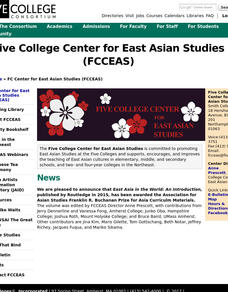Curated OER
Children in the United States and Japan
Young scholars locate Japan on a map or globe and describe the relative location of Japan. They use the Internet to investigate cultural characteristics of children in the United States and in Japan. They use a Venn Diagram as an...
Curated OER
Haiku
Students study various forms of poetry and the culture of Japan. They are introduced to a haiku- a traditional form of poetry and an art form in the Japanese culture. They write a haiku and create a student haiku booklet with the classes...
Curated OER
Egyptian Inspiration Web
Students conduct Internet research to discover information about scientific, technological, cultural and intellectual achievements in Egypt, along with Egyptian family life. Students create Inspiration webs of their findings.
Curated OER
Translating Traditions
Students analyze art reflective of traditions and cultural heritage. For this art analysis lesson, students complete image based discussion.
Curated OER
The Third Question
Students reflect upon the rewards of providing services to others, and whether by giving they might perhaps be gaining at the same time. They explain how or why Knowing a foreign language can help people make new friends and build a new...
Curated OER
Cultural Calendar
Students design their own cultural calendar. In this calendar making instructional activity, students decide on a culture for a calendar theme and discuss how calendars differ from the US calendar. Students create their own...
Curated OER
Dialogue: Languagae Learning
For this dialogue about language learning worksheet, young scholars read questions and answers concerning learning various languages.
Annenberg Foundation
Annenberg Learner: Bridging World History: Family and Household
Turn from the typical studies of society's politics, economics, etc. to focus on the way the family unit fits into society in this unit.









